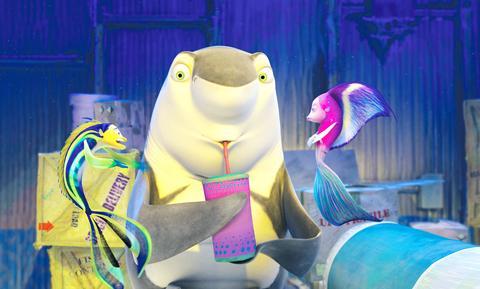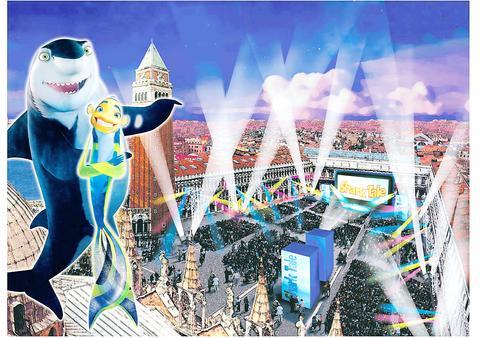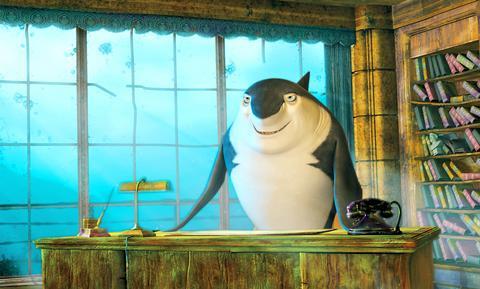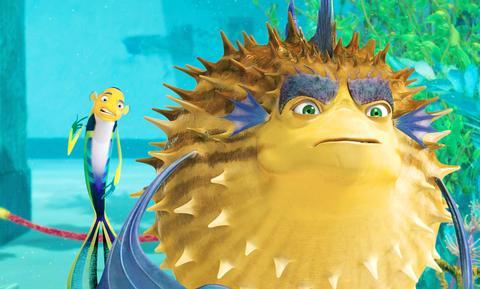On our way to a screening of Shark Tale, my daughter and I fell into a discussion of Finding Nemo, a movie she has seen several dozen times. The subject came up naturally enough, since the movie we were about to see, which opens nationwide today, is DreamWorks's attempt to follow Disney and Pixar into the lucrative and technologically demanding world of underwater computer-generated 3-D animation. In anticipation of the novel delights of Shark Tale, my daughter was happy to revise her earlier high opinion of Nemo. "It's about a fish who gets lost," she said with a shrug. "That's not really very interesting."
As if on guard against such jadedness, the makers of Shark Tale have ensured that their movie is about as many things as possible, including a fish who gets lost, though not quite in the way that Nemo did. The busy story, in any case, with its predictable messages -- Be who you are! Don't forget where you came from! Fish are friends, not food! -- is secondary to the packaging, a bright, hectic swirl of easy jokes and accessible pop-culture allusions.

There are cheerful quasi-ethnic stereotypes -- jellyfish Rastafarians, shark Mafiosi, aquatic ghetto kids with cans of spray paint -- that are technically insulated against offensiveness because, well, they're all fish. There are movie-star voices galore -- Robert De Niro, Will Smith, Renee Zellweger, Jack Black, Angelina Jolie -- and even, more unusually, a recognizable movie-director voice and caricature. I'm relieved (and maybe just a tiny bit disappointed) to report that when Sykes, a fast-talking blowfish with bushy eyebrows, appeared on screen, my daughter, who is 5, did not lean over and whisper, "Hey, isn't that Martin Scorsese?"

But of course Scorsese was not there for her benefit. Like the Shrek pictures, also from DreamWorks, Shark Tale lobs a barrage of movie and television references over the heads of the children in the audience and into the faces of their parents. Some of these are visual, like Sykes' resemblance to the auteur reading his lines, while others pop up on the soundtrack, which quotes the scores from The Godfather, Car Wash and, of course, Jaws. For the finale, fishy likenesses of Christina Aguilera and Missy Elliott strut and prance while the real-life divas sing us through the closing credits.
Smith, as charming with fins and scales as he is in the flesh, plays Oscar, a feckless fish who works at Sykes's whale wash. Zellweger is the receptionist, Angie. She is madly in love with Oscar, who regards her, to her chagrin, as his best pal and nothing more. Meanwhile, Don Lino (De Niro), the capo of the local shark mob, is having trouble with his younger son, Lenny (Black), a sensitive guy who can't stomach either his family business or the predatory ways of his species.

The plots converge when Lenny's brother, who is about to make a snack out of Oscar, smashes into an anchor. Oscar becomes a local celebrity -- the Shark Slayer -- while Lenny's identity crisis becomes even more acute. A further complication arrives in the slinky form of Lola (Jolie), a gold-digging fish fatale who steals Oscar away from loyal, good-hearted Angie. It all ends pretty much the way you expect it will.

There are some inspired scenic touches -- a seahorse racetrack, Sykes's whale wash -- but the undersea environment lacks the sublimity and detail of Nemo. The fish faces, especially in kisses and close-ups, are more clammy than cute, though the sharks have a doughy integrity and some of the minor players, like Don Lino's octopus consigliere and a plate of terrified shrimp cocktail, are cleverly rendered. All in all, Shark Tale is reasonably good fun, even if, in the end, it's not really very interesting.

The canonical shot of an East Asian city is a night skyline studded with towering apartment and office buildings, bright with neon and plastic signage, a landscape of energy and modernity. Another classic image is the same city seen from above, in which identical apartment towers march across the city, spilling out over nearby geography, like stylized soldiers colonizing new territory in a board game. Densely populated dynamic conurbations of money, technological innovation and convenience, it is hard to see the cities of East Asia as what they truly are: necropolises. Why is this? The East Asian development model, with

June 16 to June 22 The following flyer appeared on the streets of Hsinchu on June 12, 1895: “Taipei has already fallen to the Japanese barbarians, who have brought great misery to our land and people. We heard that the Japanese occupiers will tax our gardens, our houses, our bodies, and even our chickens, dogs, cows and pigs. They wear their hair wild, carve their teeth, tattoo their foreheads, wear strange clothes and speak a strange language. How can we be ruled by such people?” Posted by civilian militia leader Wu Tang-hsing (吳湯興), it was a call to arms to retake

This is a deeply unsettling period in Taiwan. Uncertainties are everywhere while everyone waits for a small army of other shoes to drop on nearly every front. During challenging times, interesting political changes can happen, yet all three major political parties are beset with scandals, strife and self-inflicted wounds. As the ruling party, the Democratic Progressive Party (DPP) is held accountable for not only the challenges to the party, but also the nation. Taiwan is geopolitically and economically under threat. Domestically, the administration is under siege by the opposition-controlled legislature and growing discontent with what opponents characterize as arrogant, autocratic

When Lisa, 20, laces into her ultra-high heels for her shift at a strip club in Ukraine’s Kharkiv, she knows that aside from dancing, she will have to comfort traumatized soldiers. Since Russia’s 2022 invasion, exhausted troops are the main clientele of the Flash Dancers club in the center of the northeastern city, just 20 kilometers from Russian forces. For some customers, it provides an “escape” from the war, said Valerya Zavatska — a 25-year-old law graduate who runs the club with her mother, an ex-dancer. But many are not there just for the show. They “want to talk about what hurts,” she